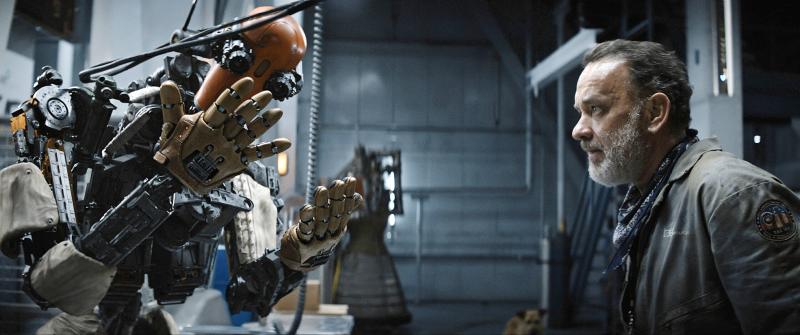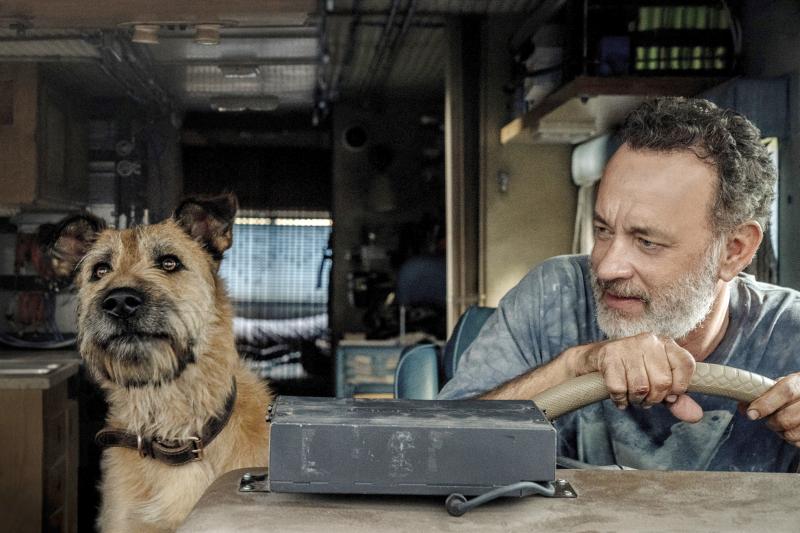Tom Hanks doesn’t need a human or even a sentient acting partner to make a film or a scene sing. Think Wilson the volleyball, Hooch and even that laptop from You’ve Got Mail. So it’s not at all surprising if he’s the first guy on the list for your post-apocalyptic film about a man, a robot and a dog.
Even less surprising is that Hanks delivers in Finch, playing a robotics engineer who is dying from radiation exposure and desperately trying to make sure his dog will be taken care of when he’s gone. It’s the kind of premise that’s been designed to pull at your heartstrings. Dying Tom Hanks and a cute pup? It’s impossible to resist. And yet somehow it doesn’t work as the epic it would like to be.
The story started out as a 20-page short about a man who builds a robot to replace him as a dog’s caretaker from a film student named Craig Luck. He wanted it to be a calling card and despite some initial rejections, his last name proved apt since his idea charmed Ivor Powell, the associate producer on Blade Runner and Alien, who co-wrote the feature, Robert Zemeckis, who produced, Hanks, Game of Thrones director Miguel Sapochnik and a major Hollywood studio (although Universal ended up selling the film to Apple TV+ during the pandemic).

Photo: AP
Here, Earth has been rendered a dusty wasteland after a solar event destroyed the ozone layer now direct sunlight is the most dangerous thing in the world. It cooks any living thing within moments of being exposed.
Unlike the stranded, solitary men of Cast Away” and The Martian, Finch has no family or home to get back to. He’s dying and the world is dying around him and he just wants to do everything he can to make sure the dog can live without him. The solution is rushed and imperfect — a robot who he’s going to have to train on the go and is only at 72 percent completion — but they’re running out of time and have to make a treacherous journey to San Francisco in an RV from the ‘80s.
This robot is impressively strong and book smart but is more teenager than obedient servant. And his accent is a cross between Russian and the Twin Peaks Black Lodge backwards speak. This is the choice made by actor Caleb Landry Jones (a nod to his appearance in the Twin Peaks revival?), who also did motion capture work to play the robot. And, well, I’m not sure if it’s the voice or how the character was written, but this robot is hard to root for. Sometimes you find yourself wishing that he’d never been introduced at all, which is not exactly the best thing when he’s one of only three characters.

Photo: AP
Finch’s scope and scale also were clearly designed for the big screen and an attentive audience, which might prove difficult on a living room television (the same felt true of Apple TV+’s other Tom Hanks epic, Greyhound, which was still a superior movie.) Although many of the visuals are quite familiar for anyone who has seen a post-apocalyptic movie in the past 20 years, they are striking and detailed nonetheless, and no doubt underserved by even the best small screen. The music cues, meanwhile, could not be more obvious (ahem, Road to Nowhere).
And it’s no one’s fault that a film with cautionary messages about delaying travel and living life while you can may be a little hard to swallow for an audience approaching year two of life in a pandemic.
But you’re probably not coming to “Finch” for lessons, you’re coming to “Finch” for Hanks. The good news is that he’s not just the reason to show up, he’s the reason to stay around as well.

Photo: AP
Finch is released today on Apple TV+. Running time: 115 minutes.

Since their leader Ko Wen-je (柯文哲) and others were jailed as part of several ongoing bribery investigations, the Taiwan People’s Party (TPP) has risen in the polls. Additionally, despite all the many and varied allegations against Ko and most of the top people in the party, it has held together with only a tiny number of minor figures exiting. The TPP has taken some damage, but vastly less than the New Power Party (NPP) did after it was caught up in a bribery scandal in 2020. The TPP has for years registered favorability in the thirties, and a Formosa poll

Chiayi County is blessed with several worthwhile upland trails, not all of which I’ve hiked. A few weeks ago, I finally got around to tackling Tanghu Historic Trail (塘湖古道), a short but unusually steep route in Jhuci Township (竹崎). According to the Web site of the Alishan National Scenic Area (阿里山國家風景區), the path climbs from 308m above sea level to an elevation of 770m in just 1.58km, an average gradient of 29 percent. And unless you arrange for someone to bring you to the starting point and collect you at the other end, there’s no way to avoid a significant amount

Nov. 4 to Nov. 10 Apollo magazine (文星) vowed that it wouldn’t play by the rules in its first issue — a bold statement to make in 1957, when anyone could be jailed for saying the wrong thing. However, the introduction to the inaugural Nov. 5 issue also defined the magazine as a “lifestyle, literature and art” publication, and the contents were relatively tame for the first four years, writes Tao Heng-sheng (陶恒生) in “The Apollo magazine that wouldn’t play by the rules” (不按牌理出牌的文星雜誌). In 1961, the magazine changed its mission to “thought, lifestyle and art” and adopted a more critical tone with

While global attention is finally being focused on the People’s Republic of China (PRC) gray zone aggression against Philippine territory in the South China Sea, at the other end of the PRC’s infamous 9 dash line map, PRC vessels are conducting an identical campaign against Indonesia, most importantly in the Natuna Islands. The Natunas fall into a gray area: do the dashes at the end of the PRC “cow’s tongue” map include the islands? It’s not clear. Less well known is that they also fall into another gray area. Indonesia’s Exclusive Economic Zone (EEZ) claim and continental shelf claim are not